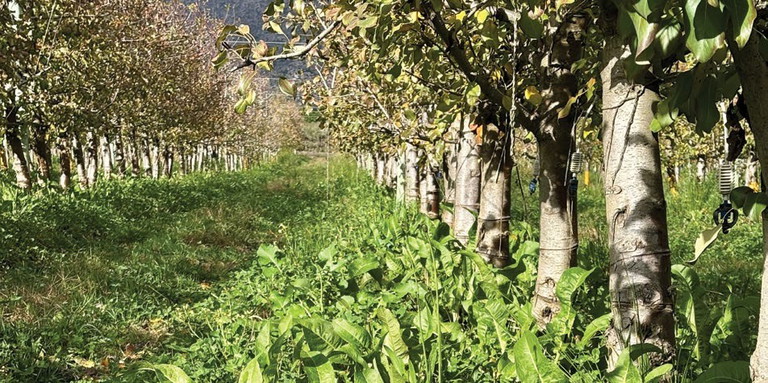POMEWEST
Case study
Farming in harmony: Lorraine Farm’s 20-year regenerative journey
Nestled in the fertile lands of Ceres, Western Cape, Lorraine Farm stands as a beacon of transformation in agriculture. Over the past two decades, this farm has shifted from conventional farming practices to a regenerative model that embraces nature, sustainability, and resilience. Led by Hendrik Pohl of Holistic Horticulture, the farm’s journey is a testament to the power of long-term vision and ecological stewardship.

Green living mulch at Lorraine Fram.
Industry overview: scale, export, and market reach
In 2003, Lorraine Farm took its first bold step by introducing compost mulch, straw, and wood chips into its post-harvest routine. Fertiliser use was halted entirely, relying instead on orchard observations to guide nutrient management. This approach carried risks: insufficient nitrogen and potassium levels could threaten productivity. Yet, the team persisted, applying only nitrogen when absolutely necessary and trusting the orchard’s natural balance.
A joint venture was formed to ensure consistent, high-quality compost rich in microbial life. This biological foundation laid the groundwork for healthier soils and more resilient crops.
Building biodiversity and soil health
Fast forward to 2025, and Lorraine Farm’s orchards are thriving ecosystems. Cover crops now blanket the orchard floor, producing mulch in situ and fixing essential nutrients like nitrogen and potassium. Medic, white, and crimson clover were sown on the berms and inter-row to cycle potassium and create habitats for beneficial insects, enhancing biodiversity and natural pest control.
Remarkably, the farm has not required nematode or woolly apple aphid treatments for 20 years, a clear indicator of ecological balance.
The fruits of regeneration
Lorraine Farm consistently achieves higher yields with excellent fruit size, colour, and internal quality. Water use efficiency has improved dramatically, and the orchards are more resilient to environmental stressors.
This success validates the farm’s decision to transition away from traditional agriculture and towards a model rooted in economic, social, and environmental principles.
Their vision is clear: sustainable orchards that work with nature, not against it.